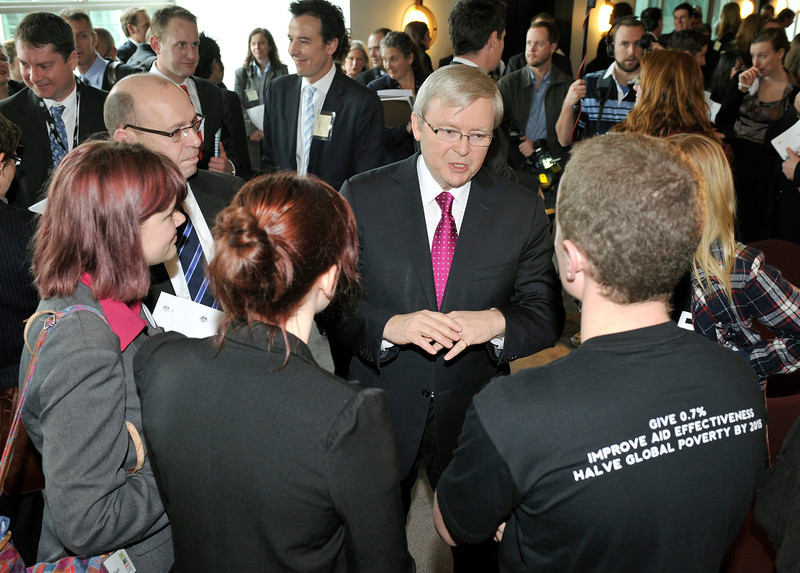In this special edition of the buzz, we provide a quick round-up of some of the commentary (outside of the DevPolicy blog) surrounding the Aid Review and the Government’s response.
From NGO’s and the aid sector
Marc Purcell, executive director of the Australian Council for International Development representing over 70 Australian not-for-profit aid and development organisations, made a statement warmly welcoming the Review and the Government’s response. He finally comments that:
The success or otherwise of these reforms will hang on a strong, capable and well-resourced Government aid program – led by AusAID… In next year’s budget, this will need to be addressed.
Gary Lee, co-director of the overseas aid monitoring group AID/WATCH, also released a statement welcoming the Government’s response to the Review, but says that it falls short in a number of areas. He raises concern about the continuing use of national interest as one of the criteria for determining the allocation of aid and claims that the Office of Development Effectiveness should be established as an independent body, separate from AusAID. AID/WATCH was also disappointed that the Government has not committed to establishing AusAID as a separate department with a cabinet-level minister for aid and development.
On the whole, the response from NGO’s and the aid sector within Australia appears to be overwhelmingly positive and supportive of both the Review’s recommendations and the Government’s response (see further responses from CARE, Oxfam and World Vision).
Responses in the media
Jose Ramos-Horta, President of East Timor, delivered an opinion piece in the Sydney Morning Herald commenting that he was pleased with the number of practical steps being taken in making effectiveness the cornerstone of the aid program. He was also pleased with the reduction in Technical Assistance and warns further about the fragmentation of the aid program. Overall:
These are important developments but effectiveness is a journey, not a destination, and will require persistence by all parties to achieve
James Ensor, Oxfam Australia Director of public policy, also writing an opinion piece for the Sydney Morning Herald, commends much of the Review and the Government’s response. He also warns of the complexity of poverty. He highlights the need for further commitments to support human rights, gender equality and making sure poor people have a greater role in their own development.
Rowan Callick, Asia-Pacific editor at the Australian, writes that the aid Review fails to answer the key question of whether foreign aid actually helps poorer nations. He argues that:
such a review is so wholeheartedly welcomed by the bodies it was established to interrogate must raise questions about its presumptions and its political setting.
He concludes that helping others is good, but a genuine debate about how we best do that is overdue and that the review has not given us one.
Robert Zoellick, president of the World Bank Group, provided an opinion piece in The Australian expressing his delight to see the Australian Government endorse the recommendations of its cutting-edge aid review. He commends the Review for grounding its focus on results for the Australian taxpayer and its renewed focus on multilateral agencies, including the World Bank. He wraps up stating:
This new aid review puts Australia firmly on the path to more influence and greater effectiveness. That’s food for development, that’s good for the world’s poor and that’s good for Australia.
Paul Murray, writing an opinion piece for the West Australian, provides a more scathing critique of the Review and the Government’s response. He argues tha there is probably no better example of the disconnect between political dialogue in Canberra and the nation than in our approach to foreign aid. He goes as far as to state:
What the report was too polite to say, but what I believe, is the lack of transparency and failure to communicate have been explicit policy settings of successive governments to keep this issue away from the public… Politicians need to grow a backbone and engage the public in discussion about why spending an extra $4-5 billion on poorer nations is in our national interest.
Missing from the party
Surprisingly, there has been little to no commentary on the review from other policy centres and institutes within Australia. Of particular note, the Lowy Interpreter, which ran it’s own comprehensive blog (‘interpreting the aid review’) dedicated to the aid review process, has gone quiet on the issue since the Review was submitted to Government. This comes as a surprise in light of the growing role that aid is going to play, thanks to the budget doubling by 2015/16, in the future of Australian international relations.
We value your feedback
At the Development Policy Centre, we live and breath development policy, following and contributing to ongoing debates. We want to share more of what we’re reading with you and would welcome your feedback on your interests. This blog post contains a cross-section of topics–let us know what you think. What’s creating a buzz for you?


